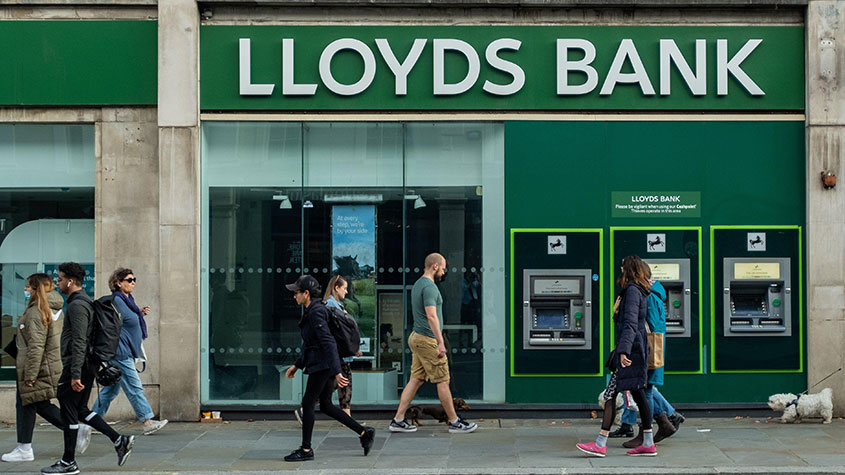Lloyds Bank shares could see an interest-rate windfall
Interest rates are heading higher, which could be good news for Lloyds Bank shares as profits are set to grow.


Get the latest financial news, insights and expert analysis from our award-winning MoneyWeek team, to help you understand what really matters when it comes to your finances.
You are now subscribed
Your newsletter sign-up was successful
Want to add more newsletters?

Twice daily
MoneyWeek
Get the latest financial news, insights and expert analysis from our award-winning MoneyWeek team, to help you understand what really matters when it comes to your finances.

Four times a week
Look After My Bills
Sign up to our free money-saving newsletter, filled with the latest news and expert advice to help you find the best tips and deals for managing your bills. Start saving today!
It’s fair to say a lot has changed for Lloyds Bank shares since the mid-1990s. In 1997 the group reported a post-tax return on equity (RoE) of 40%. At its latest half year result, the lender was praised by the City for raising its full-year guidance from 10% to 13% RoE.
The outlook for Lloyds Bank shares has changed
Analysing what has changed and what hasn’t is instructive. Lloyds needed under £6bn of shareholders’ equity to deliver post-tax profit of £2.35bn in 1997.
In those days, when the Spice Girls were topping the charts and Pete Sampras was winning Wimbledon, shareholders’ equity was just under 4% of total assets of £158bn.
MoneyWeek
Subscribe to MoneyWeek today and get your first six magazine issues absolutely FREE

Sign up to Money Morning
Don't miss the latest investment and personal finances news, market analysis, plus money-saving tips with our free twice-daily newsletter
Don't miss the latest investment and personal finances news, market analysis, plus money-saving tips with our free twice-daily newsletter
Shareholders’ equity stands at £50bn today, and the bank’s total assets have ballooned to £886bn. But profits have not kept pace with the bank’s balance sheet growth. If they had, then Lloyds would be reporting the highest profits of any company in the FTSE 100 index.
Dividend growth has also been a disappointment. The total payout of £0.9bn on Lloyds Bank shares in 2021 was just the same as the distribution in 1997.
The good news is there are some favourable tailwinds blowing across the banking sector.
Inflation and rising interest rates
Lloyds doesn’t have a problem with funding – it has £478bn of deposits, up £70bn compared to a couple of years ago.
As restaurants were closed and travel was difficult over the pandemic, consumers had few options to spend, and savings ended up accumulating in bank accounts.
As the bank is offering loyal savings customers just 0.2% interest on savings, annualised interest expense for the bank is just £500m on those almost half trillion pounds of customer deposits.
The bank can take these deposits and lend the money overnight to the Bank of England earning 1.75% with no risk or buy UK Government bonds, currently yielding above 3%. In simple terms, Lloyds is not passing on the benefit of interest rate rises to savers, and if this continues will enjoy windfall profits.
Windfall profits should be a net positive for Lloyds Bank shares, although the past two decades have shown that bad behaviour by banks and poor PR has been bad news for shareholder returns, while senior management has continued to do very nicely from bonuses.
Will falling house prices dent profits?
The biggest risk to the company’s outlook is the prospect of an economic slowdown and falling house prices, which will lead to rising bad debt impairments.
The cheap mortgage deals and stamp duty holidays which re-ignited the UK housing market during the pandemic have come to an end. Rates on two-year fixed mortgage deals have trebled in the space of 12 months.
This tightening of credit conditions is already having an effect on the market. The Bank of England’s most recent figures show mortgage approvals, a lead indicator for the housing market, down 14% year on year.
Lloyds mortgage book stands at £310bn and has an average loan to value (LTV) ratio of 40%. Unlike the run-up to the financial crisis, Lloyds has just 3% of mortgage balances on an LTV of greater than 80% as regulators have discouraged high LTV lending.
In other words, house prices could fall 20%, and just 3% of the bank’s mortgage borrowers would find themselves in negative equity. That means a fall in house prices similar to that seen in the 2008 crisis is not, in itself, enough to cause the bank a problem.
The unknowable risk to Lloyds Bank shares
Instead, the unknowable risk is unemployment. The Bank of England is forecasting five consecutive quarters of recession, with unemployment, a lagging indicator, starting to rise halfway through next year.
For context, in the three years following the financial crisis Lloyds took an impairment charge of £8.9bn in the retail bank alone, of which £4.2bn was in 2009. The vast majority of those impairments were from unsecured bad debts, such as credit cards, rather than the mortgage book.
Industry data shows credit card borrowing is increasing by 13% annually, the highest annual rate since October 2005 (+13.7%) could be an early warning sign of problems to come.
In response, Lloyds says that credit borrowing is not being driven by the cost of living crisis.
Instead, wealthier households are spending on non-essentials like travel, which is up 300% year on year and has now recovered to pre-Covid levels. Analyst consensus forecasts for the bank show current expectations are for losses well below those experienced following the financial crisis: £1.2bn impairment for group bad debts next year, rising to £1.4bn in the 2024 financial year.
If those forecasts turn out to be right, then the bank is trading on a price/earnings ratio of below seven times 2023 and 2024 earnings. The forecast dividend yield is close to 6%.
Enjoying a benefit from rising interest rates means that Lloyds Bank shares could outperform the wider market, as most stocks are harmed by rising interest rate expectations.
Get the latest financial news, insights and expert analysis from our award-winning MoneyWeek team, to help you understand what really matters when it comes to your finances.

Bruce is a self-invested, low-frequency, buy-and-hold investor focused on quality. A former equity analyst, specialising in UK banks, Bruce now writes for MoneyWeek and Sharepad. He also does his own investing, and enjoy beach volleyball in my spare time. Bruce co-hosts the Investors' Roundtable Podcast with Roland Head, Mark Simpson and Maynard Paton.
-
 Should you buy an active ETF?
Should you buy an active ETF?ETFs are often mischaracterised as passive products, but they can be a convenient way to add active management to your portfolio
-
 Power up your pension before 5 April – easy ways to save before the tax year end
Power up your pension before 5 April – easy ways to save before the tax year endWith the end of the tax year looming, pension savers currently have a window to review and maximise what’s going into their retirement funds – we look at how
-
 The UK cities where it’s cheaper to buy a house than rent
The UK cities where it’s cheaper to buy a house than rentFor people in some areas of the country, home ownership is a distant dream. But for others it can be surprisingly affordable.
-
 Crypto scams – what to look out for
Crypto scams – what to look out forFraudsters are using cryptocurrency scams to lure investors desperate for high returns - here is how to spot and avoid them
-
 Halifax: House price slump continues as prices slide for the sixth consecutive month
Halifax: House price slump continues as prices slide for the sixth consecutive monthUK house prices fell again in September as buyers returned, but the slowdown was not as fast as anticipated, latest Halifax data shows. Where are house prices falling the most?
-
 Rents hit a record high - but is the opportunity for buy-to-let investors still strong?
Rents hit a record high - but is the opportunity for buy-to-let investors still strong?UK rent prices have hit a record high with the average hitting over £1,200 a month says Rightmove. Are there still opportunities in buy-to-let?
-
 Pension savers turn to gold investments
Pension savers turn to gold investmentsInvestors are racing to buy gold to protect their pensions from a stock market correction and high inflation, experts say
-
 Where to find the best returns from student accommodation
Where to find the best returns from student accommodationStudent accommodation can be a lucrative investment if you know where to look.
-
 The world’s best bargain stocks
The world’s best bargain stocksSearching for bargain stocks with Alec Cutler of the Orbis Global Balanced Fund, who tells Andrew Van Sickle which sectors are being overlooked.
-
 Revealed: the cheapest cities to own a home in Britain
Revealed: the cheapest cities to own a home in BritainNew research reveals the cheapest cities to own a home, taking account of mortgage payments, utility bills and council tax